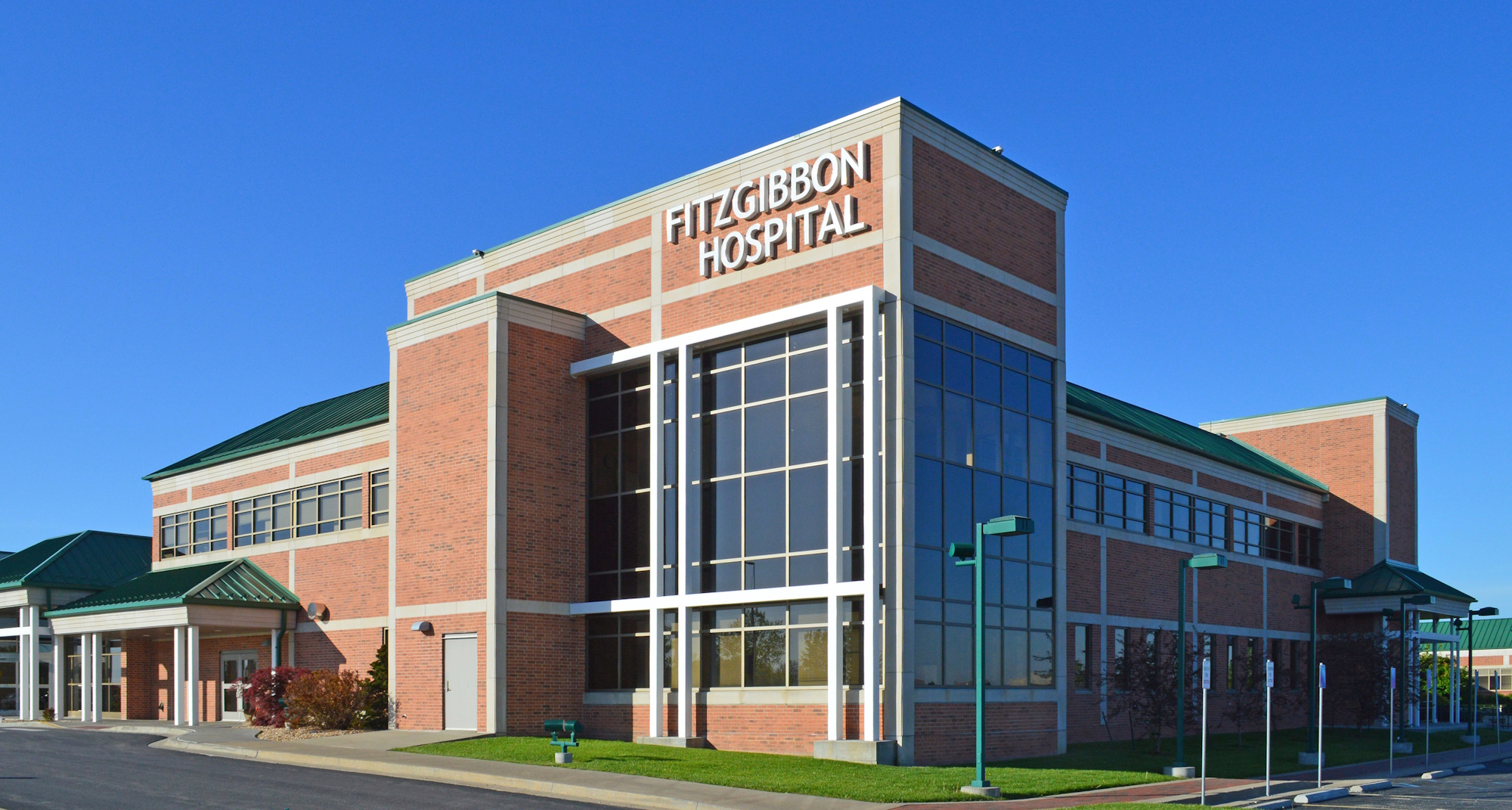Fitzgibbon Hospital adopts best practices, innovative technologies and cutting-edge techniques from hospitals at the epicenter
April 23, 2020

When the COVID-19 pandemic was declared on March 13, 2020, the epicenter of the virus seemed a half a world away. But that’s when Fitzgibbon Hospital leaders began exploring ways to protect their healthcare workers and the community, while ensuring access to care. Members of the organization’s leadership team studied best practices of world-class institutions on the front lines of the battle, like the Biocontainment Unit at the University of Nebraska-Omaha and Mount Sinai Hospital in New York City.
Following guidance from these hospitals at the forefront of the COVID-19 battle, Fitzgibbon has implemented several cutting-edge technologies and techniques right here at the 501 (c)3 community acute care hospital.
One of these innovations is a plexiglass hood, constructed by the Fitzgibbon Maintenance Department with guidance provided via Mt. Sinai Hospital. The “hood” looks like a clear box with an open side and provides a shield for caregivers during certain procedures.
“Our ER staff is able to place this plexiglass hood over the patient’s face and shoulders while performing the intubation. The hood is clear, so everyone can see exactly what needs to be done, while providing protection from the aerosol droplet spray, in addition to their regular PPE,” said Callie Post, BSN/RN, Director of Critical Care at Fitzgibbon Hospital.
Intubation is a procedure during which a tube is inserted into a patient’s airway. The tube is then connected to a ventilator to help them breathe. In the course of performing the insertion of the tube, it is common that the patient may cough, causing droplets, which could contain the virus, to be propelled into the air.
According to Angy Littrell, President and CEO of Fitzgibbon Hospital, ensuring safety of staff is a primary concern.
“We have contact with a physician on the front line in New York City, who has provided us invaluable information about what is taking place as they respond to the surge of patients over the last few weeks. This device ensures an extra layer of protection for our staff as they perform this very important procedure,” she said.
In addition to building this hood, Fitzgibbon Maintenance Department personnel have installed plexiglass dividers in primary registration points throughout the hospital to provide protection for registration staff.
Fitzgibbon Hospital also has worked to combat the short supply of personal protective equipment (PPE) by constructing and implementing a “clean room” for sterilizing N95 respirator masks with ultraviolet light. The sterilization method was initially implemented at the National Ebola Education and Training Center at the University of Nebraska Hospital in Omaha. The hospital was gifted the required high-power UV bulbs by Ham Hill Farms, Inc.
“Many hospitals around the country are implementing processes like this,” said Tom Jones, Chief Information Officer and Emergency Preparedness Coordinator for Fitzgibbon Hospital. “We have N95 masks that are assigned to personnel. At regular intervals, these masks are gathered for sterilization. We’re able to sterilize each mask numerous times, as long as they are in good condition and have not gotten excessively soiled or wet. This significantly extends the life of a medical grade N95 for our staff while keeping our patients safe.”
Another way Fitzgibbon Hospital has worked to protect patients and staff is through enhancement of negative pressure rooms. In a typical facility with air-conditioning, air is circulated through the facility with a number of air handlers. A negative pressure room allows air to be forced from the room and the building rather than being recirculated. Placing a patient in a negative pressure room means that if they have a highly infectious condition such as COVID-19, they are cared for in a room from which the air is removed. This reduces the chance of re-circulating air that potentially carries the virus. Since the virus onset, maintenance personnel has enhanced the negative air pressure capacity by studying and altering air exchanges within the facility.
In addition, they’ve installed an “air scrubber,” which is a free-standing unit used to remove the air in one of the rooms in the Women’s Center. This would be used in the event of a COVID-19 positive woman presents for delivery.
“It has taken a lot of planning and research to see how our air handlers move air through the building. We had to gather a lot of data and take readings to see how best to accomplish this facility upgrade. We needed to know what doors needed to be closed so the air moves the way we need it to for everyone’s safety,” said Rudy Reyes, Director of Maintenance for Fitzgibbon Hospital. “In addition, we also have a surgical suite that we are able to run through a HEPA ventilation system to ensure that those patients and staff are also protected, if surgery is needed for a COVID-19 positive patient.”
Fitzgibbon Hospital has also implemented telemedicine technology, which allows medical providers to interact with their patients via secure video conferencing when it is possible to do so. Currently, family practice, mental health and ob/gyn providers are using the technology, as well as the registered dietitian, who provides assistance to individuals who have medical conditions that require dietary modifications. Telemedicine services do not replace in-person visits permanently, but they do provide an opportunity for individuals to obtain follow-up care with their physicians while the pandemic is still a concern. In addition, individuals who may not have a primary care physician can utilize a “symptom checker” form on the Fitzgibbon Hospital website to forward the results to providers at Marshall Family Practice. A medical provider should return a call to individuals within one business day.
To learn more about what Fitzgibbon Hospital is doing to provide care during the COVID-19 pandemic, visit www.fitzgibbon.org/COVID-19.


